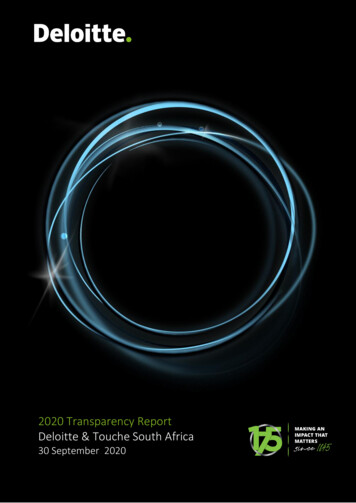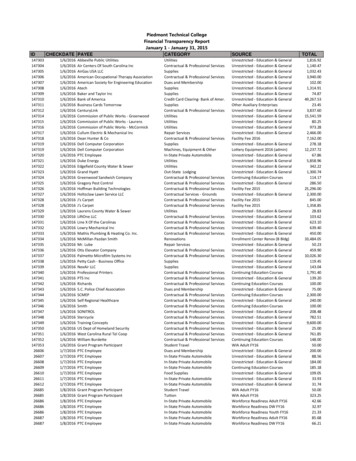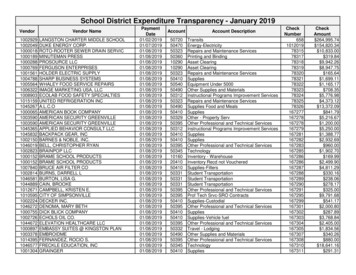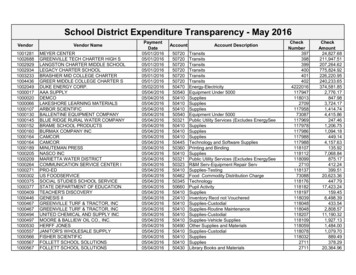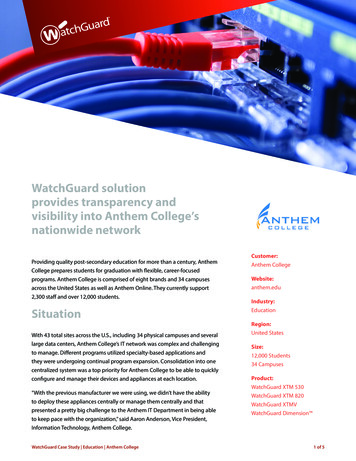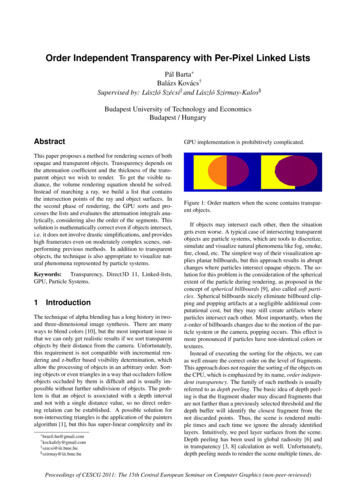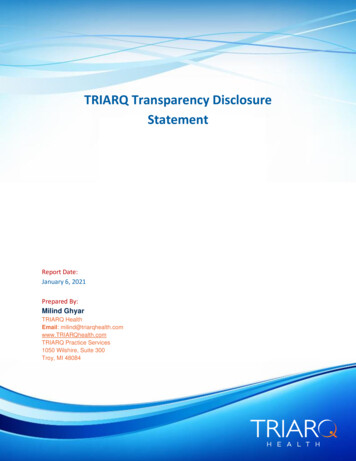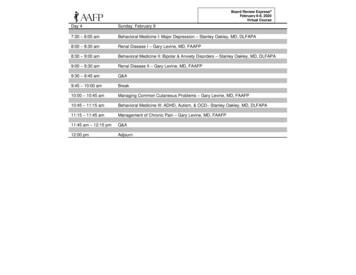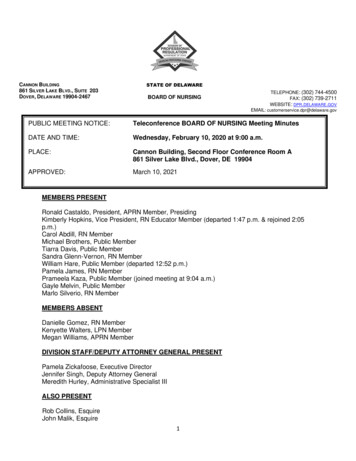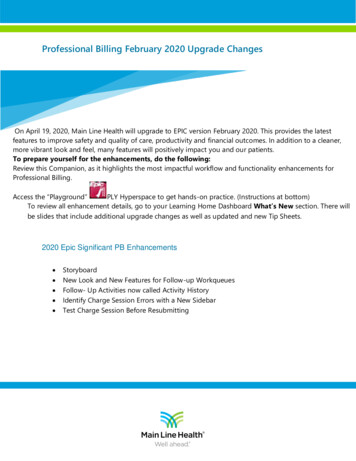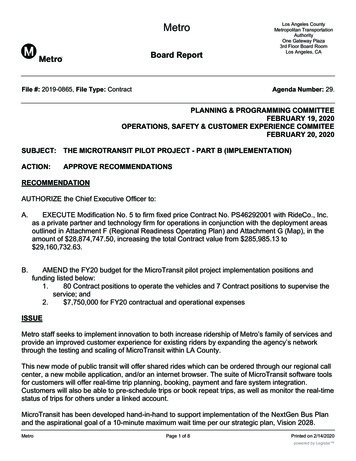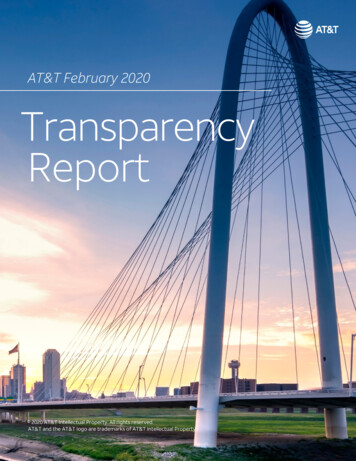
Transcription
AT&T February 2020TransparencyReport 2020 AT&T Intellectual Property. All rights reserved.AT&T and the AT&T logo are trademarks of AT&T Intellectual Property.
IntroductionAt AT&T, we take our responsibility to protect your information and privacy veryseriously. You can learn more here.This ReportLike all companies, we are required by law to provide information to government and law enforcemententities, as well as parties to civil lawsuits, by complying with court orders, subpoenas, lawful discoveryrequests and other legal requirements. This AT&T Transparency Report provides (1) specific dataregarding the number and types of legal demands to which we responded for the second half of 2019that compelled AT&T to provide information about (a) communications or (b) our customers, as well as (2)information permitted by law to be disclosed about Foreign Intelligence Surveillance Act demands for thefirst half of 2019. The Transparency Report also provides information about legal demands that werepartially or completely rejected, demands for location information, emergency requests and internationallegal demands.In this report, “AT&T” includes all of AT&T’s operating units: AT&T Communications provides mobile, broadband, video and other communications services toU.S.-based consumers and nearly 3 million companies globally — from the smallest business tonearly all the Fortune 1000. WarnerMedia is a leading media and entertainment company that creates and distributes premiumand popular content from a diverse array of talented storytellers and journalists to global audiencesthrough its consumer brands, including: HBO, HBO Now, Warner Bros., TNT, TBS, truTV, CNN, DCEntertainment, New Line, Cartoon Network, Adult Swim, Turner Classic Movies and others. AT&T Latin America offers mobile services to people and businesses in Mexico and digitalentertainment services in South America and the Caribbean. Xandr provides marketers with advanced advertising solutions enhanced with valuable customerinsights from AT&T’s TV, mobile and broadband services, combined with extensive ad inventoryincluding WarnerMedia’s cable networks and premium content from third-party media brands. 2020 AT&T Intellectual Property. All rights reserved.AT&T Transparency Report 02/11/20202
National Security DemandsNational Security LettersJuly–Dec. 2019Total Received500–999Customer Selectors Targeted500–999Foreign Intelligence Surveillance ActTotal ContentCustomer Selectors TargetedTotal Non-ContentJan.–June 20190–49913,500–13,9990–4990–499Customer Selectors TargetedTotal U.S. Criminal & Civil DemandsTotal Demands(Federal, State and Local; Criminal and Civil)July–Dec. Court Orders(General)10,265Historic7,000Real-Time (Pen registers)3,265Search Warrants/Probable Cause Court OrdersHistoric12,109Stored obile Locate Demands5,893 2020 AT&T Intellectual Property. All rights reserved.AT&T Transparency Report 02/11/20203
Demands Rejected/Partial or No Data Provided(Breakout detail of data included in Total U.S. Criminal & Civil Demands)July–Dec. al or No InformationLocation Demands(Breakout detail of data included in Total U.S. Criminal & Civil Demands)July–Dec. 2019Total48,15738,253HistoricReal-Time8,615Cell Tower1,289Emergency RequestsJuly–Dec. 2019Total65,40891151,730Exigent13,678 2020 AT&T Intellectual Property. All rights reserved.AT&T Transparency Report 02/11/20204
In-Depth AnalysisNational SecurityDemandsNational Security Letters (NSL) are administrativesubpoenas issued by the U.S. Federal Bureauof Investigation to compel production ofinformation regarding counterterrorism orcounterintelligence investigations. NSLs arelimited to non-content information, such asa list of phone numbers dialed or subscriberinformation. Legal demands issued pursuantto the Foreign Intelligence Surveillance Act(FISA) may direct us to provide content andnon-content data related to national securityinvestigations, such as international terrorism orespionage.Our reporting on NSLs and FISA orders(collectively referred to as “National SecurityDemands”) is governed by U.S. law.¹ By statute,we are permitted to report data of demandsserved on us and the “customer selectorstargeted” by those respective demands inspecifically defined numeric ranges and for onlycertain time periods.Total U.S. Criminal &Civil DemandsThis number includes demands to which weresponded in connection with criminal and civillitigation matters. This category doesn’t includedemands reported in our National SecurityDemands table.1Criminal proceedings include actions bygovernment entities — whether at the federal,state or local level — against an individual arisingfrom an alleged violation of criminal law. Becausefederal, state and local investigating authoritiesin the U.S. may each initiate criminal proceedings,we receive demands from thousands of differentlaw enforcement entities.Civil actions include lawsuits involving privateparties (e.g., a personal liability case, divorceproceeding or disputes between privatecompanies or individuals). In addition, civilproceedings include investigations bygovernmental regulatory agencies such asthe Securities and Exchange Commission, theFederal Trade Commission and the FederalCommunications Commission.Our ProcessWe receive multiple types of legal demands,including subpoenas, court orders and searchwarrants. Before we respond to any legaldemand, we determine that we have received thecorrect type of demand based on the applicablelaw for the type of information sought. Forinstance, in some states we must supply calldetail records if we receive a subpoena. In otherstates, call detail records require a probable causecourt order or search warrant. If the requestingagency has failed to send the correct type ofdemand, we reject the demand.See 50 U.S.C. § 1874, as added by the USA Freedom Act(Public Law 114-23 of June 2, 2015). 2020 AT&T Intellectual Property. All rights reserved.AT&T Transparency Report 02/11/20205
Types of Legal DemandsThe reporting category “Total U.S. Criminal & Civil Demands” reflects the type of demand with theinformation requested, particularly relating to General Court Orders and search warrants.Subpoenas don’t usuallyrequire the approval of a judgeand are issued by an officerof the court, e.g., an attorney.They are used in both criminaland civil cases, typically todemand (1) testimony orwritten business documents,such as calling records andclient contracts, (2) basicsubscriber information, suchas the name and address listedon the billing account, and (3)data related to advertisingtransactions conducted usingour advertising technology.General Court Orders aresigned by a judge. We consider“general” court orders to beall orders except those thatcontain a probable causefinding. In a criminal case, forexample, a judge may issuea court order on a lesserstandard than probablecause, such as “relevant to anongoing criminal investigation.”In criminal cases, court ordersare also used to demandreal-time, pen register/“trapand trace” information, whichprovides phone numbersand other dialed informationfor all calls as they are madeor received from the deviceidentified in the order. In acivil case, a court order maybe issued on a “relevant” or“reasonably calculated to leadto the discovery of admissibleevidence” standard.Search Warrants andProbable Cause CourtOrders are signed by a judge,and they are issued only upona finding of “probable cause.”To be issued, the warrant ororder must be supportedby sworn testimony andsufficient evidence to believethe information demanded isevidence of a crime. Probablecause is viewed as thehighest standard to demandevidence. Except in emergencycircumstances, a searchwarrant or probable causecourt order is required for allreal-time precise locationinformation (like GPS) and realtime content (such as contentobtained through wiretaps).Stored content (like stored textand voice messages) generallyalso requires a warrant.In both the criminal and civilcontext, general court ordershave been used to demandhistoric information, like billingrecords or records relating tousage of a wireless device. 2020 AT&T Intellectual Property. All rights reserved.AT&T Transparency Report 02/11/20206
Foreign-Originated Demandsfor Information about a U.S.Consumer or BusinessIf we receive an international demand forinformation about a U.S. customer, whether anindividual or business, we refer the requesterto that country’s Mutual Legal AssistanceTreaty (MLAT) process. We did not receive anyinternational demands for information abouta U.S. customer from a country that does nothave an MLAT process. The FBI ensures that wereceive the proper form of U.S. process (e.g.,subpoena, court order or search warrant), subjectto the limitations placed on discovery in the U.S.,and that cross-border data flows are handledappropriately. Thus, any international originateddemands that follow an MLAT procedure arereported in our Total Demands category becausewe can’t separate them from any other FBI legaldemand we may receive.Demand Rejected/Partialor No Data ProvidedIn this category, we include the number of timeswe rejected a demand or provided only partialinformation or no information in response toa demand. Here are a few reasons why certaindemands fall into this category: The wrong type of demand is submitted bylaw enforcement. For instance, we will rejecta subpoena demanding a wiretap, becauseeither a probable cause court order orsearch warrant is required. The demand has errors, such as missingpages or signatures. The demand was not correctly addressedto AT&T. We had no information that matched thecustomer, equipment or other informationprovided in the demand.Location DemandsOur “Location Demands” category breaks outthe number of civil and criminal legal demandswe received by the type of location information(historic or real-time) demanded. Demandsfor location information seek precise GPScoordinates of the device or call detail recordsthat reflect the location of any cell site processinga call. We also get demands for cell towersearches, which ask us to provide all telephonenumbers registered on a particular cell tower fora certain period of time. We do not keep track ofthe number of telephone numbers provided tolaw enforcement in connection with cell towersearches.A single cell tower demand may cover multipletowers. We disclose both the total number ofdemands and the total number of cell towersearches. For instance, if we received one courtorder that included two cell towers, we count thatas one demand for two searches. For the 1,289cell tower demands during this reporting period,we performed 2,749 searches. The average timeperiod that law enforcement demanded for a celltower search was 2 hours and 18 minutes for thisreporting period.Like all companies, we are required by law toprovide information to law enforcement andother government entities by complying withcourt orders, subpoenas and lawful discoveryrequests. In all cases, we review requests todetermine whether they are valid. We requirea search warrant based on the probablecause standard for all demands for real-timeor historical location information, except inemergency situations. The demand did not contain all the elementsnecessary for a response. 2020 AT&T Intellectual Property. All rights reserved.AT&T Transparency Report 02/11/20207
Emergency RequestsThe numbers provided in this category are thetotal of 911-originated inquiries and exigentrequests that we processed during this reportingperiod. 911-originated inquiries are those thathelp locate or identify a person in need ofemergency assistance. “Exigent requests” areemergency requests from law enforcementworking on kidnappings, missing person cases,attempted suicides and other emergencies.In order to protect your privacy, we require acertification from a law enforcement agencyconfirming they are dealing with a case involvingrisk of death or serious injury before we will shareinformation sought by an exigent request.International DemandsThe “International Demands” category representsthe number of civil and criminal legal demandsoriginating outside the U.S. and related to AT&T’soperations in foreign countries. These demandsare for (i) historic subscriber information aboutconsumers who reside in other countries andbusinesses that operate in other countries; and(ii) URL/IP (website/internet address) blockingdemands from foreign governments.The Diverse Services AT&T Provides Internationally Affectthe Types and Volume of Demands We ReceiveBusiness Services: AT&T providestelecommunications and IT services to theforeign offices of large multi-national businesscustomers. In all foreign countries where AT&Tsupports these customers, AT&T primarilyreceives demands for historic subscriberinformation. In those countries where AT&T alsoprovides internet access service, it may also havereceived demands for IP or URL blocking.WarnerMedia: Outside of the UnitedStates, WarnerMedia (through its operatingcompanies and subsidiaries) owns and operatesentertainment services, including basic tier andpremium television networks and direct-toconsumer streaming services, as well as newsand information services, which are distributedthrough a variety of platforms. WarnerMediacompanies also engage in the production,distribution and licensing of feature films,television programming, comic books, videogames and other products in a varietyof formats, including licensing to theaters, paytelevision services, broadcast and cable networks,on-demand services and distribution by means ofphysical discs and electronic sell-through. 2020 AT&T Intellectual Property. All rights reserved.Xandr: Outside of the United States, Xandr(through its operating companies andsubsidiaries) provides marketers and publisherswith advanced advertising technology solutionsand facilitates access to advertising inventoryfor marketers, including premium content frompremium media brands.Consumer Mobility Services: Mexico is theonly country outside of the U.S. where AT&Tprovides consumer mobility service. Accordingly,AT&T received legal demands similar to thoseit receives in the U.S., including demands forsubscriber information, location information,real-time content and wiretaps.VRIO: In all Latin American countries whereAT&T’s affiliate VRIO provides consumer satellitetelevision service, we primarily receive demandsfor subscriber information regarding our DIRECTVand SKY Brasil branded services. In those LatinAmerican countries where VRIO also providesbroadband service, we also received demands forIP or URL blocking.AT&T Transparency Report 02/11/20208
A Few Additional Points Historic Subscriber Information isinformation such as the name and addresslisted on the billing account or the types ofservices purchased from AT&T. The IP or URL blocking demands comefrom countries that require us to blockaccess to websites that they deem offensive,illegal, unauthorized or otherwiseinappropriate. These demands are listedseparately from the demands for historicsubscriber information. While AT&T may provide internet access insome foreign countries, we do not have theability to control the content of any websitesother than AT&T’s own sites. Accordingly,while we did receive and comply with 2020 AT&T Intellectual Property. All rights reserved.demands from foreign governments to blockaccess to websites in their countries duringthis reporting period, we did not receivedemands to remove content from websites(nor would we be able to do so). During thisreporting period, we did not receive anydemands from any foreign governments toproduce any stored content. Finally, the laws governing the internationaldemands that we receive differ by country.We respond to these demands based oneach country’s laws.2India, for example, does not permit publicationof demands.2AT&T Transparency Report 02/11/20209
International DemandsTotal International Demands3July–Dec. 2019ArgentinaHistoric: Subscriber Information554BrazilHistoric: Subscriber Information3906IP/URL BlockingChile15Historic: Subscriber InformationColombiaHistoric: Subscriber Information920Denmark1Historic: Subscriber InformationEcuadorHistoric: Subscriber Information83Estonia1Historic: Subscriber InformationFrance2Historic: Subscriber InformationIreland1Historic: Subscriber InformationIsrael5IP/URL BlockingItaly1Historic: Subscriber InformationPeru15Historic: Subscriber InformationRomania4IP/URL BlockingCountries where “0” has been reported have been removed from this chart. We will add countries back in future reportsshould we receive new requests in any of those countries.3 2020 AT&T Intellectual Property. All rights reserved.AT&T Transparency Report 02/11/202010
Total International DemandsJuly–Dec. 2019Russia156IP/URL BlockingSpain1Historic: Subscriber InformationSweden1Historic: Subscriber InformationTurkey7,363IP/URL BlockingUruguay1Historic: Subscriber InformationVenezuela610Historic: Subscriber Information 2020 AT&T Intellectual Property. All rights reserved.AT&T Transparency Report 02/11/202011
MexicoWiretapsThe laws applicable to demands received inMexico are listed below.Legal frameworkGeneral InformationRequirementsPolitical Constitution of the United MexicanStates, article 16, paragraph 12Federal Criminal Procedure Code, article 291Federal Law against Organized Crime, article 16Legal frameworkFederal Telecommunications and BroadcastingLaw, article 190Law on General Channels of Communications,article 122Federal Criminal Procedure Code, article 303Types of Legal DemandsIn Mexico, there is no distinction between Subpoenas and General Court Orders, as in the U.S., becausethe law provides that all demands for customer data must be reviewed and authorized by a judge.The legal demands are classified as follows:Historic Information. In acriminal case, court orders areused to demand subscriberinformation, call detail records,cell site location information,and identification data ofmobile devices. In a civil case,court orders may only beused to demand subscriberinformation.Location Information inReal-Time. Legal demandsfor this information must bereviewed and authorized by ajudge, whose ruling must bepremised on relevant criminalinvestigations and nationalsecurity. Demands for locationinformation seek precise GPScoordinates of the device orcall detail records that reflectthe location of any cell siteprocessing a call. We alsoget demands for cell towersearches, which ask us toprovide all telephone numbersregistered on a particular celltower for a certain period.We do not keep track of thenumber of telephone numbersprovided to law enforcementin connection with cell towersearches. 2020 AT&T Intellectual Property. All rights reserved.Court Order for Wiretaps.In Mexico, there is a specialprocedure for these typesof legal demands, and ajudge may authorize thewiretap order, if certain legalstandards are met and thematter is related to a criminalinvestigation or nationalsecurity.AT&T Transparency Report 02/11/202012
July–Dec. 2019Mexico9,333Historic: Subscriber Information/Call Detail Records(Includes judicial authorities and national security)Location Information (Cell Site)8,359Real-Time1,289Wiretaps735Location Information (Precise)5541,107Demands Rejected/Partial or No Data Provided(Breakout detail of data included in Total Mexico Demands)Rejected/Challenged299Partial or No Information808 2020 AT&T Intellectual Property. All rights reserved.AT&T Transparency Report 02/11/202013
Additional ResourcesYou’ll find more on our commitment to privacy in: Our issues brief on Privacy. Our issues brief on Freedom of Expression.
legal demand, we determine that we have received the correct type of demand based on the applicable law for the type of information sought. For instance, in some states we must supply call detail records if we receive a subpoena. In other states, call detail records require a probab
